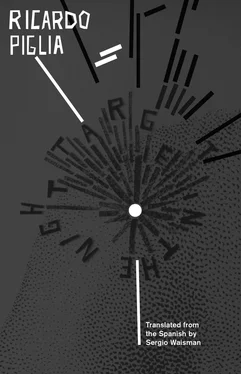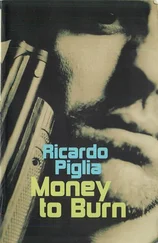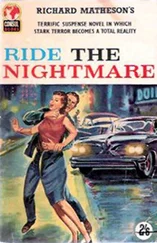“See that?” he asked, his eyes fixed on the light in the room.
He pointed at the traces of a nearly invisible dust that seemed to be floating in the air. Saldías was under the impression that Croce saw things at an unusual speed, as if he were half a second (half a thousandth of a second) ahead of others. They followed the trail of the light blue dusting — a fine mist swayed by the sun, which Croce saw as if it were footprints on the ground — to the far end of the room where there was a hanging on the wall, a black cloth square with yellow arabesques, a kind of Batik or tapestry from the pampas. It looked shabby, not like an actual decoration, it was clearly covering something. The corners of the tapestry flapped slightly in the wind that blew through the open window.
Croce removed the hanging with a letter opener that hung off of his keychain, and found that it was hiding a double-hung internal window. Opening it easily, they saw that it led into a kind of pit. There was a rope. A sheave.
“The service pulley.”
Saldías looked at him, not understanding.
“They used to serve food up to the room, if the guest ordered it. You’d call and they’d send it up through here.”
They leaned over the opening. Between the ropes they could hear the murmur of voices and the sound of the wind.
“Where does it lead?”
“To the kitchen, and the basement.”
They moved the rope on the sheave and raised the box from the small pulley up to the edge.
“Too small,” Saldías said. “No one would fit.”
“I don’t know,” Croce said. “Let’s see.” He leaned over again. Through the cobwebs, he could see a faint light below, and at the bottom a floor with checkered tiles.
“Let’s go,” Croce said. “Come on.”
They went down the elevator to the ground level and down a further flight of stairs to a blue hallway that led into the basement. They found the old, out-of-service kitchens and the boiler room. To the side there was a door that opened into a large closet with blue-tiled walls and an old, empty refrigerator. At a turn at the end of the hallway, behind a grille, was the telephone switchboard. On the other side, a half-opened, iron door connected to a storage room filled with items from lost-and-found and old items of furniture. The storeroom was wide and tall, with a black-and-white tiled floor. A window at the back wall, closed with a double-paned shutter, was the base of the service pulley with the cables connecting up to the higher floors.
The storage room contained the remainders from the hotel’s past life, randomly piled up. Trunks, wicker baskets, suitcases, tacks with messages, rolled-up canvases, empty frames, clocks, a 1962 calendar from the Belladona factory, a blackboard, a birdcage, fencing masks, a bicycle without its front wheel, lamps, lanterns, ballot boxes, a headless statue of the Virgin, a crucifix (whose eyes seemed to follow you around), sleeping cots, a wool carding machine.
There was nothing especially noticeable — except, in a corner, for a fifty-dollar bill on the floor.
Strange. A brand-new bill. Croce put it in a clear envelope with the other evidence and looked at the issue date. A fifty-dollar bill. Series 1970.
“Whose is it?”
“Could be anyone’s,” Croce said. He looked at one side of the bill and then the other, as if he were trying to identify who had dropped it. Accidentally? They paid for something and it fell out. Maybe. He saw General Grant’s face on the bill: the butcher , the drunk, a hero, a criminal, the inventor of the strategy of razing the earth, he’d go in with the army from the North and burn down cities and the fields, he’d only go into battle when he outnumbered his opponents five-to-one, he’d have all prisoners executed — Ulysses S. Grant, the butcher. Look where he ended up, on a dropped bill on the floor of a lousy hotel in the middle of nowhere. Croce stood there, thinking, the clear envelope in his hand. He showed it to Saldías as if it were a map. “See? Now I understand, my son. I mean, I think I know what happened. They came to steal from him, they went down the service pulley, they split up the money. Or they were putting it away? In their rush they dropped a fifty-dollar bill.”
“They came down?”
“Or they went up,” Croce said.
Croce leaned into the opening of the service pulley and looked up again.
“Maybe they just sent the money down and someone was waiting for it here.”
They went out the blue hallway. The telephone switchboard was off to one side, in a kind of cell, behind a glass screen and a grille.
They questioned the hotel’s operator, a Miss Coca. Thin and slight, freckly, Coca Castro knew everything about everyone, she was the best-informed person in town, she was always invited to people’s houses because everyone wanted to hear about what she knew. She made people beg. But in the end she always went and brought all the news and updates with her — and this is why she never married. She knew so much that no man dared. A woman who knows things scares men off, Croce said. She went out with import-export agents and men traveling through, and was a very good friend to the young women in town.
Croce and Saldías asked her if she had seen anything, if she had seen anyone go in or out. No, she hadn’t seen anyone that day. Then they asked her about Durán.
“Thirty-three is one of the three rooms in the hotel with a telephone,” the operator clarified. “Mr. Durán asked especially for this.”
“Who did he speak with.”
“There were a few calls. Several in English. Always from Trenton, New Jersey, in the United States. But I don’t listen to the guests’ conversations.”
“And today, when he didn’t pick up. Who was calling? Around two in the afternoon. Who was it?”
“A local call. From the factory.”
“Was it Luca Belladona?”
“I don’t know, they didn’t say. It was a man. He asked for Durán, but he didn’t know the room number. When no one answered, he asked me to try again. He waited on the line, but no one picked up.”
“Had he ever called before?”
“Durán had called there a couple of times.”
“A couple?”
“I have the records. You can take a look.”
The operator was nervous, in a murder case everyone believes the police are going to make their life complicated. Durán was a darling, he had asked her out twice. Croce immediately thought that Durán wanted information from her, that was why he would have asked her out, she could have told him things. She had refused out of respect for the Belladona family.
“Did he ask you anything specific?”
The woman seemed to roll up and retreat, like a spirit in an Aladdin’s lamp, until you could only see a red mouth.
“He wanted to know who Luca spoke with. That’s what he asked me. But I didn’t know anything.”
“Did he ever call the Belladona sisters at home?”
“A few times,” Coca said. “He spoke with Ada about everything.”
“Let’s call them, I want them to come identify the body.”
The operator dialed the number of the Belladona house. She had a satisfied expression on her face, as if she were the protagonist of an exceptional situation.
“Hello, yes, this is the Plaza Hotel,” she said. “I have a message for the Belladona Misses.”
The sisters arrived late in the afternoon and quietly entered the hotel. The occasion was such that they had decided to break the taboo, or superstition, which had kept them for years from being seen together in town. The sisters were like replicas, the symmetry between them was so similar it was almost sinister. Croce had a familiarity with them that came not only from seeing them around town occasionally.
“Who told you?”
Читать дальше












